- Home
- Tony Abbott
The Serpent's Curse
The Serpent's Curse Read online
DEDICATION
To Guardians everywhere
CONTENTS
Dedication
Chapter One
Chapter Two
Chapter Three
Chapter Four
Chapter Five
Chapter Six
Chapter Seven
Chapter Eight
Chapter Nine
Chapter Ten
Chapter Eleven
Chapter Twelve
Chapter Thirteen
Chapter Fourteen
Chapter Fifteen
Chapter Sixteen
Chapter Seventeen
Chapter Eighteen
Chapter Nineteen
Chapter Twenty
Chapter Twenty-One
Chapter Twenty-Two
Chapter Twenty-Three
Chapter Twenty-Four
Chapter Twenty-Five
Chapter Twenty-Six
Chapter Twenty-Seven
Chapter Twenty-Eight
Chapter Twenty-Nine
Chapter Thirty
Chapter Thirty-One
Chapter Thirty-Two
Chapter Thirty-Three
Chapter Thirty-Four
Chapter Thirty-Five
Chapter Thirty-Six
Chapter Thirty-Seven
Chapter Thirty-Eight
Chapter Thirty-Nine
Chapter Forty
Chapter Forty-One
Chapter Forty-Two
Chapter Forty-Three
Chapter Forty-Four
Chapter Forty-Five
Chapter Forty-Six
Chapter Forty-Seven
Chapter Forty-Eight
Chapter Forty-Nine
Chapter Fifty
Chapter Fifty-One
Chapter Fifty-Two
Chapter Fifty-Three
Chapter Fifty-Four
Chapter Fifty-Five
Chapter Fifty-Six
Chapter Fifty-Seven
Chapter Fifty-Eight
Chapter Fifty-Nine
Chapter Sixty
Chapter Sixty-One
Chapter Sixty-Two
Chapter Sixty-Three
Epilogue
Author’s Note
Acknowledgments
About the Author
Praise
Books by Tony Abbott
Credits
Back Ads
Copyright
About the Publisher
CHAPTER ONE
New York City
March 17
8:56 p.m.
Twelve hidden relics.
One ancient time machine.
A mother, lost.
Seven minutes before the nasty, pumped-up SUV appeared, Wade Kaplan slumped against his seat in the limousine and scowled silently.
None of his weary co-passengers had spoken a word since the airport. They needed to. They needed to talk, and then they needed to act, together, all of them—his father, astrophysicist Dr. Roald Kaplan; his whip-sharp cousin Lily; her seriously awesome friend Becca Moore; and his stepbrother—no, his brother—Darrell.
“Ten minutes, we’ll be in Manhattan,” the driver said, his eyes constantly scanning the road, the mirrors, the side windows. “There are sandwiches in the side compartments. You must be hungry, no?”
Wade felt someone should respond to the older gentleman who’d met them at the airport, but no one did. They looked at the floor, at their hands, at their reflections in the windows, anywhere but eye to eye. After what seemed like an eternity, when even Wade couldn’t make himself answer, the question faded in the air and died.
For the last three days, he and his family had come to grips with a terrifying truth. His stepmother, Sara, had been kidnapped by the vicious agents of the Teutonic Order of Ancient Prussia.
“You can see the skyline coming up,” the driver said, as if it were perfectly all right that no one was speaking.
Ever since Wade’s uncle Henry had sent a coded message to his father and was then found murdered, Wade and the others had been swept into a hunt for twelve priceless artifacts hidden around the world by the friends of the sixteenth-century astronomer Nicolaus Copernicus—the Guardians.
The relics were originally part of a machina tempore—an ancient time machine that Copernicus had discovered, rebuilt, journeyed in, and then disassembled when he realized the evil Teutonic Order was after it.
What did an old time machine have to do with Sara Kaplan?
The mysterious young leader of the present-day Teutonic Knights, Galina Krause, burned to possess the twelve Copernicus relics and rebuild his machine. No sooner had the children outwitted the Order and discovered Vela—the blue stone now safely tucked into the breast pocket of Wade’s father’s tweed jacket—than the news came to them.
Sara had vanished.
Galina’s cryptic words in Guam suddenly made sense. Because the Copernicus legend hinted that Vela would lead to the next relic, Sara would be brought to wherever the second relic was likely to be—to serve as the ultimate ransom.
Wade glanced at the dark buildings flashing past. Their windows stared back like sinister eyes. The hope that had sustained his family on their recent layover in San Francisco—that Sara would soon be freed—had proved utterly false.
They were crushed.
Yet if they were crushed, they were also learning that what didn’t kill them might make them stronger—and smarter. Since their quest began, Wade had grown certain that nothing in the world was coincidental. Events and people were connected across time and place in a way he’d never understood before. He also knew that Galina’s minions were everywhere. Right now, sitting in that car, he and his family were more determined than ever to discover the next relic, overcome the ruthless Order, and bring Sara home safe.
But they couldn’t sulk anymore, they couldn’t brood; they had to talk.
Anxious to break the silence, Wade cleared his throat.
Then Lily spoke. “Someone’s following us. It looks like a tank.”
His father, suddenly alert, twisted in his seat. “A Hummer. Dark gray.”
“I see it,” the driver said, instantly speeding up. “I’m calling Mr. Ackroyd.”
The oversize armored box thundering behind them did indeed look like a military vehicle, weaving swiftly between the cars and gaining ground.
“The stinking Order,” Lily said, more than a flutter of fear in her voice.
“Galina knew our plans from San Francisco,” Wade said. “She knows every single thing about us.”
“Not how much we hate her,” said Darrell, his first words in two hours.
That was the other thing. If their global search for the Copernicus relics—Texas to Berlin to Italy to Guam to San Francisco—had made them stronger, it had made them darker, too. For one thing, they were armed. Two dueling daggers, one owned by Copernicus, the other by the explorer Ferdinand Magellan, had come into their hands. Wade was pretty sure they’d never actually use them, but having weapons and being a little more ruthless might be the only way to get Sara back.
“Galina Krause will kill to get Vela,” Becca said, gripping Lily’s hand as the limo bounced faster up the street. “She doesn’t care about hurting people. She wants Vela and the next relic, and the next, until she has them all.”
“That’s precisely what I’m here to avoid,” the driver said, tearing past signs for the Midtown Tunnel. He appeared to accelerate straight for the tunnel, but veered abruptly off the exit. “Sorry about that. We’re in escape mode.”
Roald sat forward. “But the tunnel’s the fastest way, isn’t it?”
“No options in tunnels,” the driver said. “Can’t turn or pass. Never enter a dark room if there’s another way.”
He powered to the end of the exit ramp, then took a sharp left under the expressway and accelerated onto Van Dam Street. The back tires let loose for a second, and they drifted through the turn, which, luckily, wasn’t crowded. Less than a minute later, they were racing down Greenpoint Boulevard, took a sharp left onto Henry, a zig onto Norman, a zag onto Monitor, then shot past a park onto a street called Driggs.
Why Wade even noticed the street names in the middle of a chase, he didn’t know, but observing details had also become a habit over the last days. Clues, he realized, were everywhere, not merely to what was going on now, but to the past and the future as well.
Becca searched out the tinted back window. “Did we lose them?”
“Three cars behind,” the driver said. “Hold tight. This will be a little tricky—”
Wade’s father braced himself in front of the two girls. Dad! Wade wanted to say, but the driver wrenched the wheel sharply to the right, the girls lurched forward, and he himself slid off his seat. The driver might have been hoping that last little maneuver would lose the Hummer. It didn’t. The driver sped through the intersection on Union Avenue and swerved left at the final second, sending two slow-moving cars nearly into each other. That also didn’t work. The Hummer was on their tail like a stock car slipstreaming the tail of the one before it.
Lily went white with fear. “Why don’t they just—”
“Williamsburg Bridge,” the driver announced into a receiver that buzzed on the dashboard, as if he were driving a taxi. “Gray Hummer, obscured license. Will try to lose it in lower Manhat—”
They were on the bridge before he finished his sentence. So was the Hummer, closing in fast. Then it flicked out its lights.
Becca cried, “Get down!”
There were two flashes from its front passenger window and two simultaneous explosions, one on either side of the car. The limo’s rear tires blew out. The driver punched the brakes, but the car slid sideways across two lanes at high speed, struck the barrier on the water side, and threw the kids hard against one another. Shots thudded into the side panels.
“Omigod!” Lily shrieked. “They’re murdering us—”
As the limo careened toward the inner lane, the Hummer roared past and clipped the limo hard, ramming it into the inside wall. The limo spun back across the road, then flew up the concrete road partition. Its undercarriage shrieked as it slid onto the railing and then stopped sharply, pivoting across the barrier and the outside railing like a seesaw.
The driver slammed forward into the exploding air bag. Lily, Becca, Wade, and Roald were thrown to the floor. Darrell bounced to the ceiling and was back down on the seat, clutching his head with both hands.
Then there was silence. A different kind of silence from before. The quiet you hear before the world goes dark.
Looking out the front, Wade saw a field of black water and glittering lights beyond.
The limo was dangling on the bridge railing, inches from plunging into the East River.
CHAPTER TWO
“Is everyone . . . ,” somebody was saying when Wade lifted his throbbing head. The Hummer had spun around fifty yards up the bridge, pulled into the outside lane, and was now aimed at the damaged limo, revving its engine.
Wade yanked up on the door handle. “Get out of the car!” The door wouldn’t open. He kicked it. Pain spiked his leg. “Darrell—”
A thin stream of blood trickling down his cheek, Darrell kicked too. The door squealed open a crack. Lily and Becca threw themselves at it. The hinges groaned and the door fell to the roadway. The sudden loss of weight in the back sent the limo teetering forward. There was a moan from behind the wheel.
“The driver!” Wade’s father said. He shattered the divider to the front compartment, then grabbed the man’s shoulder and squirmed carefully over the seat to him. First puncturing the air bag, he jerked open the passenger door to his right and dragged the driver through it onto the pavement, just as the Hummer pulled up. Four black doors flew open and four oak-sized men emerged.
One of the men walked out into the road and gestured for the oncoming cars to go past. Was he smiling?
Yes, he was.
Wade’s frantic thoughts drew to a point: stay close, physically close, to Darrell and the girls. He huddled them together, himself in front. His father staggered over with the driver leaning on his shoulder.
One thick-necked thug, somewhere between seven and ten feet tall, glared down at them with eyes the color of iron. His face was dented and garbage-can ugly.
“Make no movements,” he said in a voice like a truck shifting gears. Then he must have thought better of his words, because he added, “One movement. Give us relic and daggers.”
Seriously? Wade thought. He’s clarifying his threat? Who does that?
But there was nothing funny in the guy’s features. There were lumps all over his face as if he’d been the one in the accident, but they were neither recent nor red. He’d grown up a monstrosity, Wade guessed, so what choice did he have but to become a thug?
No, that wasn’t right. Everyone had a choice.
“Now,” the man grunted, drawing an automatic weapon from inside his tight-fitting jacket. He stood with his big boots planted flat on the pavement like one of the bridge girders.
Sirens sounded from the streets they had just come from.
“Or we could wait for the cops,” Wade said, stepping forward as if his new toughness meant being aggressive and blurting stuff at bad guys. His father, still holding up the driver, yanked him back.
In a move Wade didn’t quite understand, one of the thugs splayed his thick fingers and grabbed Lily by the arm. Then he lifted her off the ground like a rag doll—probably because she was the smallest—and strode with her to the railing. “She goes over.”
Before Wade could react, before he could think of moving, his father slid the driver onto him and jumped at the thug, wrenching his arm to let Lily go, which the man didn’t—until there was a sudden flash of silver, and the goon screamed.
Shouting incomprehensibly, Becca had thrust Magellan’s priceless dagger into the man’s arm. Its ivory hilt cracked off in her hand, while the blade stayed in him. She pulled Lily from him and staggered back, stunned at what she had done.
Wade whipped out his own dagger, ready to fight, when a sleek white town car raced up the bridge from the Manhattan side, a blue light flashing from its dashboard.
The other goons dragged their wounded comrade into the Hummer, Becca’s hiltless blade still in his arm.
“Ve get you all, dead and dead—” one goon was muttering idiotically.
Not this time, Wade thought, staring at Becca. Because of you . . .
The town car shrieked to a stop, and the passenger door flew open. “I’m Terence Ackroyd,” the driver said. “Everybody in!” Then he helped Wade’s father slide the limo driver inside. As the Hummer tore back to Brooklyn, the others piled into the town car, and they roared away, shaken but alive and mostly unhurt.
Wade couldn’t breathe, couldn’t speak. Becca was amazing, he thought. She saved us. She . . . He quaked like an old man, his hands trembling uncontrollably as they sped across the bridge into the winding streets of lower Manhattan.
CHAPTER THREE
Madrid, Spain
March 18
2:06 a.m.
Thin, pale, and slightly bent, the brilliant physicist Ebner von Braun stepped wearily inside a non-descript building buried in a warren of backstreets off the Plaza Conde de Barajas in old Madrid.
Madrid may well be one of the most beautiful cities in the world, Ebner thought, but that entry hall was disgusting. It was dismal and dark, its floor was uneven, and its grotesquely peeling walls were sodden with the odor of rancid olive oil, scorched garlic, and, surprisingly, turpentine.
Breathing through a handkerchief, he pressed a button on the wall. The elevator doors jerked noisily aside. He stepped in, and the racket of the ancient cables began. A long minute and several subbasem
ents later, he found himself strolling the length of a bank of large, high-definition computer monitors.
Here, the smell was of nothing at all, the pristine, climate-controlled cleanliness of modern science. Ebner gazed over the backs of three hundred men and women, their fingers clacking endlessly on multiple keyboards, text scrolling up and down, screen images shifting and alive with video, and he smiled.
Such busy little bees they are!
Except they are not little bees, are they? he thought. They are devils. Demons—Orcs!—all recruited, mostly by me, for the vast army of Galina Krause and the Knights of the Teutonic Order.
The round chamber, one hundred forty feet side to side, with multiple tiers of bookcases rising to a star-painted ceiling, reminded him of the main reading room in the British Museum.
Except ours is better.
In addition to the NSA-level computing resources collected here, the bookshelves and glass-fronted cases alone were laden with over seven million reference books in every conceivable language, hundreds of thousands of manuscripts, many more thousands of early printed works, geographical and topographical maps, marine charts, celestial diagrams, paintings, drawings, engravings, ledgers, letters, tracts, notebooks, and assorted rare or secret documents, all collected from the last five and a half centuries of human history for one purpose: to document every single event in the life of Nicolaus Copernicus.
Behold, the Copernicus Room.
After four years, the massive servers had at last come online, and this army of frowning scientists, burrowing historians, scurrying archivists, and bleary-eyed programmers was now assembled to collect, collate, and cross-reference every conceivable atom of available knowledge to track Copernicus’s slightest movement from the day of his birth, on 19 February 1473, to his fateful journey from Frombork, Poland, in 1514, with his assistant, Hans Novak, to his discovery of the time-traveling, relic-bejeweled astrolabe in a location still unknown, and every moment else, all the way to his death in Frombork Castle, on 24 May 1543.
All to determine the identity of the twelve first Guardians.
Now that the modern-day Guardians had invoked the infamous Frombork Protocol, which decreed that the relics be gathered from their hiding places around the world to be destroyed, Ebner found himself wondering for the millionth time: Who were these original protectors, the good men and women whom Copernicus asked to guard his precious relics? One was Magellan, yes. They knew how his relic was secreted in a cave on the island of Guam. Another was the Portuguese trader Tomé Pires, who brought the poisonous Scorpio relic to China, a relic nearly recovered in San Francisco two days ago. But who were the other ten? And what of the mysterious twelfth relic?

 The Great Jeff
The Great Jeff Underworlds #1: The Battle Begins
Underworlds #1: The Battle Begins Superhero Silliness
Superhero Silliness Treasure of the Orkins
Treasure of the Orkins Queen of Shadowthorn
Queen of Shadowthorn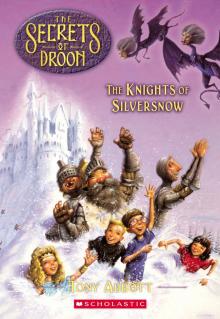 The Knights of Silversnow
The Knights of Silversnow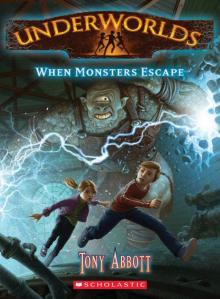 Underworlds #2: When Monsters Escape
Underworlds #2: When Monsters Escape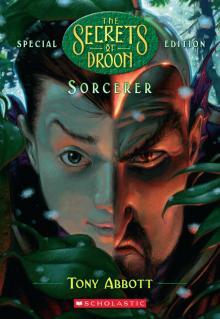 Sorcerer
Sorcerer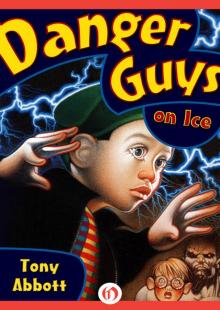 Danger Guys on Ice
Danger Guys on Ice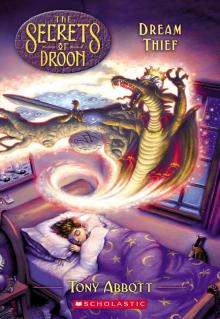 Dream Thief
Dream Thief The Moon Scroll (The Secrets of Droon #15)
The Moon Scroll (The Secrets of Droon #15) The Coiled Viper
The Coiled Viper Pirates of the Purple Dawn
Pirates of the Purple Dawn What a Trip!
What a Trip! Moon Magic
Moon Magic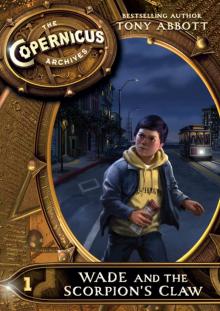 Wade and the Scorpion's Claw
Wade and the Scorpion's Claw Incredible Shrinking Kid!
Incredible Shrinking Kid!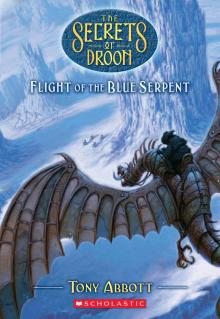 Flight of the Blue Serpent
Flight of the Blue Serpent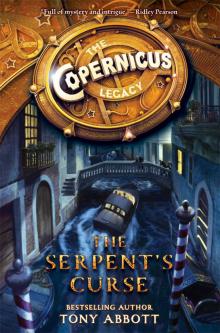 The Serpent's Curse
The Serpent's Curse Gigantopus from Planet X!
Gigantopus from Planet X! The Great Ice Battle
The Great Ice Battle Under the Serpent Sea (The Secrets of Droon #12)
Under the Serpent Sea (The Secrets of Droon #12) The Riddle of Zorfendorf Castle
The Riddle of Zorfendorf Castle Lost Empire of Koomba
Lost Empire of Koomba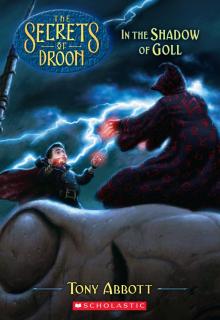 In the Shadow of Goll
In the Shadow of Goll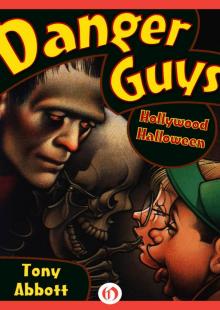 Danger Guys
Danger Guys The Copernicus Archives #2
The Copernicus Archives #2 Lunch-Box Dream
Lunch-Box Dream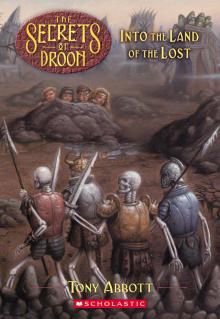 Into the Land of the Lost
Into the Land of the Lost Cosmic Boy Versus Mezmo Head!
Cosmic Boy Versus Mezmo Head! The Crazy Classroom Caper
The Crazy Classroom Caper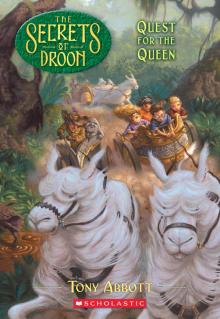 Quest for the Queen
Quest for the Queen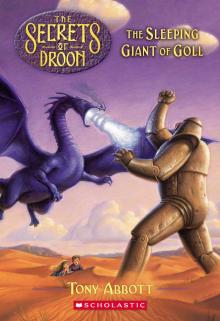 The Sleeping Giant of Goll
The Sleeping Giant of Goll The Startling Story of the Stolen Statue
The Startling Story of the Stolen Statue Brain That Wouldn't Obey!
Brain That Wouldn't Obey! The Ha-Ha-Haunting of Hyde House
The Ha-Ha-Haunting of Hyde House In the Ice Caves of Krog
In the Ice Caves of Krog In the Ice Caves of Krog (The Secrets of Droon #20)
In the Ice Caves of Krog (The Secrets of Droon #20) Beast from Beneath the Cafeteria!
Beast from Beneath the Cafeteria! Mississippi River Blues: (The Adventures of Tom Sawyer) (Cracked Classics, 2)
Mississippi River Blues: (The Adventures of Tom Sawyer) (Cracked Classics, 2)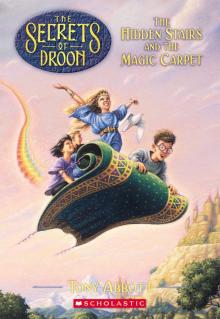 The Hidden Stairs and the Magic Carpet
The Hidden Stairs and the Magic Carpet The Mysterious Island
The Mysterious Island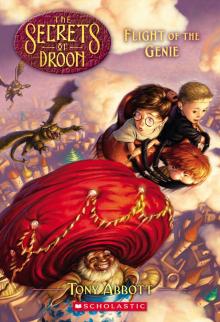 Flight of the Genie
Flight of the Genie Voyage of the Jaffa Wind
Voyage of the Jaffa Wind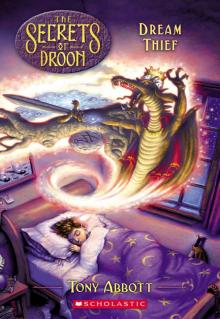 Dream Thief (The Secrets of Droon #17)
Dream Thief (The Secrets of Droon #17) Danger Guys Hit the Beach
Danger Guys Hit the Beach Escape from Jabar-loo
Escape from Jabar-loo Zombie Surf Commandos from Mars!
Zombie Surf Commandos from Mars! Firegirl
Firegirl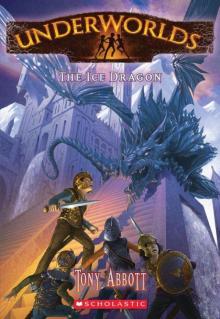 Underworlds #4: The Ice Dragon
Underworlds #4: The Ice Dragon Attack of the Alien Mole Invaders!
Attack of the Alien Mole Invaders! The Chariot of Queen Zara
The Chariot of Queen Zara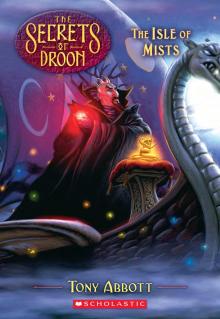 The Isle of Mists
The Isle of Mists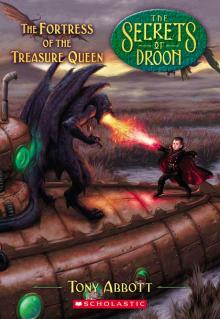 The Fortress of the Treasure Queen
The Fortress of the Treasure Queen The Moon Scroll
The Moon Scroll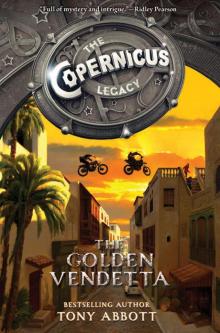 The Golden Vendetta
The Golden Vendetta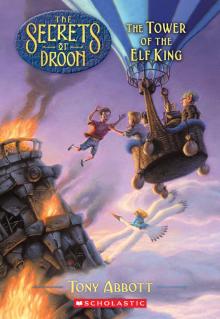 The Tower of the Elf King
The Tower of the Elf King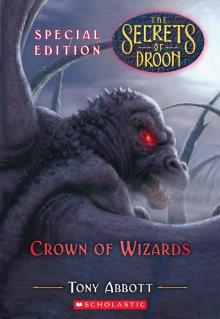 Crown of Wizards
Crown of Wizards Search for the Dragon Ship
Search for the Dragon Ship Wizard or Witch?
Wizard or Witch?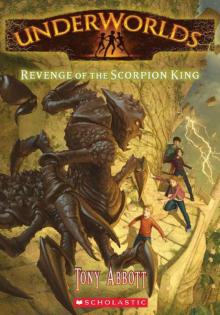 Underworlds #3: Revenge of the Scorpion King
Underworlds #3: Revenge of the Scorpion King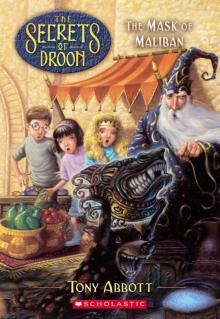 The Mask of Maliban (The Secrets of Droon #13)
The Mask of Maliban (The Secrets of Droon #13) The Summer of Owen Todd
The Summer of Owen Todd City in the Clouds
City in the Clouds Knights of the Ruby Wand
Knights of the Ruby Wand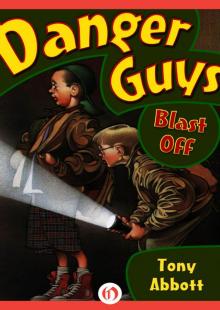 Danger Guys Blast Off
Danger Guys Blast Off Danger Guys and the Golden Lizard
Danger Guys and the Golden Lizard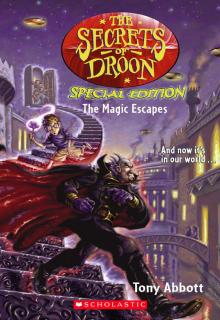 The Magic Escapes
The Magic Escapes Mississippi River Blues
Mississippi River Blues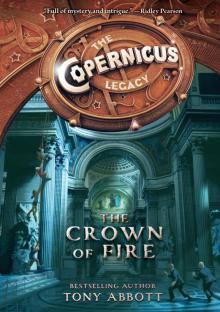 The Crown of Fire
The Crown of Fire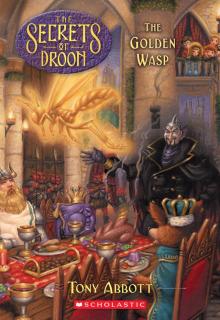 The Golden Wasp
The Golden Wasp Voyage of the Jaffa Wind (The Secrets of Droon #14)
Voyage of the Jaffa Wind (The Secrets of Droon #14) Denis Ever After
Denis Ever After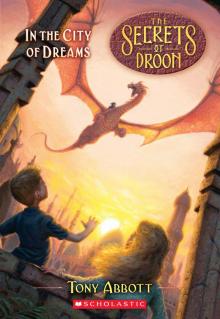 In the City of Dreams
In the City of Dreams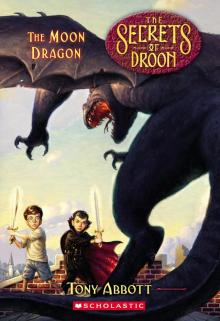 The Moon Dragon
The Moon Dragon Revenge of the Tiki Men!
Revenge of the Tiki Men!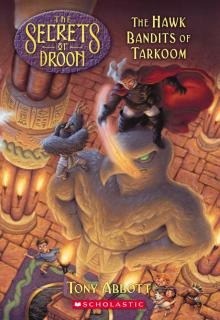 The Hawk Bandits of Tarkoom
The Hawk Bandits of Tarkoom The Postcard
The Postcard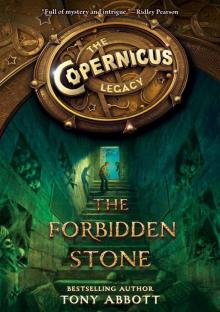 The Copernicus Legacy: The Forbidden Stone
The Copernicus Legacy: The Forbidden Stone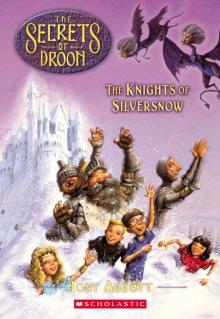 The Knights of Silversnow (The Secrets of Droon #16)
The Knights of Silversnow (The Secrets of Droon #16) Under the Serpent Sea
Under the Serpent Sea Voyagers of the Silver Sand
Voyagers of the Silver Sand X Marks the Spot
X Marks the Spot The Crazy Case of Missing Thunder
The Crazy Case of Missing Thunder Journey to the Volcano Palace
Journey to the Volcano Palace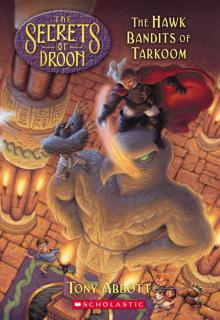 The Hawk Bandits of Tarkoom (The Secrets of Droon #11)
The Hawk Bandits of Tarkoom (The Secrets of Droon #11) The Race to Doobesh
The Race to Doobesh Trapped in Transylvania
Trapped in Transylvania Humbug Holiday
Humbug Holiday Goofballs 4: The Mysterious Talent Show Mystery
Goofballs 4: The Mysterious Talent Show Mystery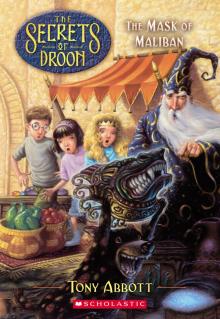 The Mask of Maliban
The Mask of Maliban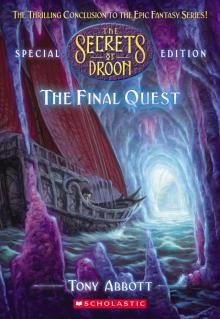 Final Quest
Final Quest The Genie King
The Genie King Crushing on a Capulet
Crushing on a Capulet